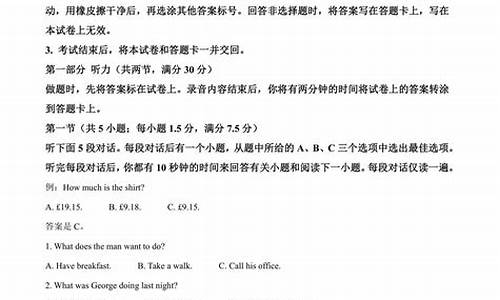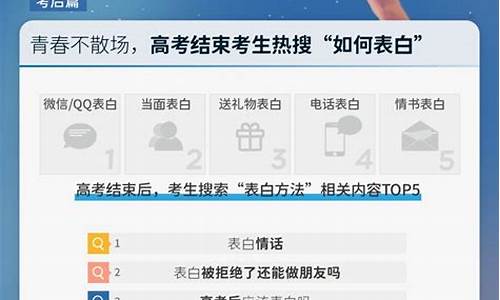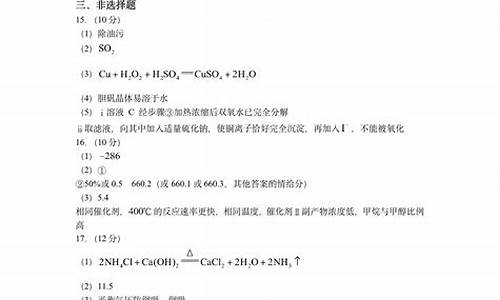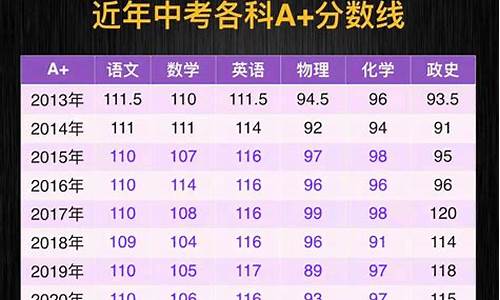您现在的位置是: 首页 > 教育政策 教育政策
高考英语选择题及答案解析,高考英语选择题及答案
tamoadmin 2024-07-06 人已围观
简介1.2005英语高考全国卷3选择18题解答2.一道高考英语选择题求讲解3.浙江高考英语阅读题附答案4.高考英语选择试题5.请教高考英语选择题。6.求高中英语直接引语变间接英语的选择题,带答案的,采纳有重金100财富值,决不食言2010.08.28之前有效7.快成人高考了有几道英语选择题我不会麻烦大家解释解释.另外我语法知识不扎实经常忘记怎么办?十分感谢8.问几道高考英语选择题,有解释最好答案是A.
1.2005英语高考全国卷3选择18题解答
2.一道高考英语选择题求讲解
3.浙江高考英语阅读题附答案
4.高考英语选择试题
5.请教高考英语选择题。
6.求高中英语直接引语变间接英语的选择题,带答案的,采纳有重金100财富值,决不食言2010.08.28之前有效
7.快成人高考了有几道英语选择题我不会麻烦大家解释解释.另外我语法知识不扎实经常忘记怎么办?十分感谢
8.问几道高考英语选择题,有解释最好

答案是A. being involved
of 介词短语作定语
在这个介词短语中
of 后面是动名词的复合结构 作介词of的宾语
his wife =his wife‘s 是动名词的逻辑主语
因为是被动关系 故 用动名词的被动形式
CD选项 不能作 介词宾语
B选项 是主动 故错
句子意思 鲍勃不喜欢 他的妻子被卷入那件事 的那个想法。
2005英语高考全国卷3选择18题解答
1.-Excuse me , will you please tell me the way to the railway station?
-Oh, sorry ,I don't know. You ______ go and ask the policeman.
A. may B.must C.would D.have to
(答案是A,请告诉我为什么不能选B)
答:考情态动词。
译:劳驾,请您告诉我去火车站怎么走好吗?
哦,对不起,我不知道。你可以去问那个警察。
B. must 必须,D. have to 不得不,C.would 虚拟语气,放进去都不合适。
2.-Is this book ________you left on the bus yesterday?
-Yes,it is.
A.that B.what C the one D how
(答案是C,为什么不选择A?)
答:变成肯定句:This book is ______ (定语从句)。
一看就知道句子缺表语,只有the one=the book
that 是指示代词,不需要限制性定语从句的。
3.Sir, my car doesn't work.
Don't worry , I'll look into the matter. Just have a little ______
A. wait B time C room D rest
(答案是B,请问B是不是稍等的意思,还有为什么不选择A?)
答:此题设计有误,答案有误。
本题改自96高考全国卷:
I’ll look into the matter as soon as possible. Just have a little _______.
A. wait B. time C. patience D. rest
最佳答案是C。译:我会尽早调查此事,你就耐心稍等吧。
楼主题的后一句是祈使句,是对顾客说的话。答案B显然是错误的。我们有祝对方玩得愉快的祈使句:Have a good time!=Have fun! 不知道这个Have a little time.是啥意思?绝对不是表达“我需要一点时间”,也不是“你有一点时间”。 楼主你的题让大家都进了某个圈套了!
反过来,这题在经过这么一改之后,B. time, C. room 可以排除,剩下只有AD可以考虑。
D. Just have a little rest. 好象是“请稍为休息一下", 似乎可以,但这个little要改为short
同样A. Just have a little wait. 好象是“ 请稍等一下”,似乎也行,但这个little 也要改为short.
不要说wait不能作名词,请看词典上的例句:
1 (C)等,等待; 等待的时间
We had a long ~ for the train.
我们等火车已经等了很久
wait, 和rest 是有时间长度的,一般long或short来修饰,且wait在这里是可数名词,little 作为形容词来解释是“小的”,用词不当。
have a rest中的rest也是可数名词,这个little形容词一样的不合适。
而a little patience中的patience 是不可数名词,a little 是用来修饰不可数名词的,表示“一点”,有肯定之意。little =not much ,与之相对。
所以本题是一个改坏了的题目,没有答案!
一道高考英语选择题求讲解
前半句while watching tv,其省略了主语和be动词,可还原为while ( we were ) watching tv,说明其主语为人,根据主语一致性,排除AB。
再根据hear sb do/doing sth ,排除D。所以正确答案为C。
浙江高考英语阅读题附答案
现在进行时表将来的用法比较主观和口语化,主语为人且多用于第一、二人称;
第三人称可考虑使用将来进行时;
本题显然是不定式短语做定语表将来,正确答案A。
以上讲解可参见《剑桥高级英语语法》(英语在用系列)。
另外可参考高考原题:
1)2003上海春季第21题;
2)2006湖南第35题;
3)2006四川第26题;
4)2008陕西第8题;
另请1楼、2楼和4楼同学更正答案和讲解,:)
高考英语选择试题
浙江高考英语阅读精选题附答案
阅读能力是浙江高考英语考察的重要英语能力,提高英语阅读能力十分重要。下面我为大家带来浙江高考英语阅读精选题,欢迎同学们阅读练习。
浙江高考英语阅读精选题(一)
I was due to take my driving test at 11:30 am.It was a rainy morning with low clouds and as I approached the driving school at 9:50 am,my heart sank.My driving instructor. Stan,said something,trying to drive away my fears,but I was not impressed
We set off for the test centre with an hour to go I wanted a run round the test circuit (圈),but we got stuck in a traffic jam,and could only drive no faster than walking.
We arrived at the test centre at 11 am.Stan made me watch a group of six learners emerging from the building with their respective(各自的)examiners.Their instructors were looking out from two windows.We watched them drive off They must have been feeling very nervous
Stan took me round the probable test track,pointing out the traps.The weather became even worse It seemed to make me feel worse too.I had developed a couldn't-care-less mood,and was almost calm We returned to the test centre in time to see the six unfortunates returning.Their nerves must have been in a terrible state.
I sat in the waiting room until six examiners came in to call out our respective names. Mine showed no emotion as he asked me to go to my car I showed none either,but the tension began mounting again.
1.On their way to the test center,Stan tried to comfort the author_________
A.but it made the author's heart sink deeper
B.but the words produced no effect
C.so that the author could drive to the center with no fears
D.so that they could prepare for all he flaps
2.Which of the following is TRUE according to the passage?
A.Six learners would be tested at the same time.
B.The learners were tested in the presence of their instructors
C.None of the six learners passed the test in the end.
D The instructors were as nervous as the learners
3.When the author was sitting in the waiting room,he was quite_________
A.upset B.nervous C.frightened D.relaxed
4.When it was his turn to take the test,the author went to his car with___________
A.firm confidence B mixed emotions C.increased nervousness D.perfect calmness
5.The passage is mainly about___________
A.the influence of bad weather upon a test taker
B the feelings of a learner before his driving test
C the preparations before a driving test
D.an unforgettable day
浙江高考英语阅读精选题答案
1.B
2.A
3.D
4.C
5.B
浙江高考英语阅读精选题(二)The evidence for harmony may not be obvious in some families. But it seems that four out of five young people now get on with their parents, which is the opposite of the popularly-held image(形象)of unhappy teenagers locked in their room after endless family quarrels.
An important new study into teenage attitudes surprisingly shows that their family life is more harmonious than it has ever been in the past."We were surprised by just how positive today's young people seem to be about their families," said one member of the research team. "They're expected to be rebellious(叛逆的)and selfish, but actually they have other things on their minds: they want a car and material goods, and they worry about whether school is serving them well. There's more negotiation(商议)and discussion between parents and children, and children expect to take part in the family decision-making process. They don't want to rock the boat."
So it seems that this generation of parents is much more likely than parents of 30 years ago to treat their children as friends."My parents are happy to discuss things with me and willing to listen to me," says 17-year-old Daniel Lazall. "I always tell them when I'm going out clug. As long as they know what I'm doing, they're fine with it." Susan Crome, who is now 21, agrees. "Looking back on the last 10 years, there was a lot of what you could call negotiation. For example, as long as I'd done all my homework, I could go out on a Saturday night. But I think my grandparents were a lot stricter with my parents than that."
Maybe this positive view of family life should not be unexpected. It is possible that the idea of teenage rebellion is not rooted in real facts. A researcher comments,"Our surprise that teenagers say they get along well with their parents comes because of a brief period in our social history when teenagers were regarded as different beings. But that idea of rebelling and breaking away from their parents really only happened during that one time in the 1960s when everyone rebelled. The normal situation throughout history has been a smooth change from helping out with the family business to taking it over."
1.What is the popular image of teenagers today?
A.They worry about school.
B.They dislike living with their parents.
C.They have to be locked in to avoid troubles.
D.They quarrel a lot with other family members.
2.The study shows that teenagers don't want to__________ .
A.share family responsibility
B.cause trouble in their families
C.go boating with their family
D.make family decisions
3.Compared with parents of 30 years ago, today's parents__________ .
A.go to clubs more often with their children
B.are much stricter with their children
C.care less about their children's life
D.give their children more freedom
4.According to the author, teenage rebellion__________ .
A.may be a false belief
B.is common nowadays
C.existed only in the 1960s
D.resulted from changes in families
5.What is the passage mainly about?
A.Negotiation in family.
B.Education in family.
C.Harmony in family.
D.Teenage trouble in family.
浙江高考英语阅读精选题答案
1.D
2.B
3.D
4.A
5.C
;请教高考英语选择题。
单项填空精选1 (共15小题;每小题1分,满分15分)
请认真阅读下面各题,从题中所给的A、B、C、D四个选项中,选出最佳选项,并在答题卡上将该项涂黑。
21. _________ rat found ________ space between two boxes and hurriedly got in, leaving the eat crying helplessly behind, nothing to do.
A. A; a B. A; the C. The; a D. The; the
22. As we all know, the is now making every _________ to set up a harmonious society.
A. effort B. effect C. measure D. performance
23. -- Has anything new been discussed on that problem so far?
-- __________ , and more will follow, I think.
A. Little B. Much C. Few D. All
24. The problem, according to the experts, is ________ we should do with the salty land.
A. what B. whether C. how D. that
25. Usually the teachers will be busy ________ the test papers after an examination.
A. grading B. naming C. ranking D. grouping
26. --Oh, darling, you're wearing a new sweater today? It looks great on you.
--Thanks, Tom, I'm glad you ________ . How nice!
A. saw B. minded C. liked D. noticed
27. Through the open window we saw on the floor the happy father lying ________ his stomach, his daughter riding excitedly on his back.
A. on B. with C. above D. from
28. With everything arranged properly, the project is surely to _________ smoothly as planned, step by step.
A. improve B. increase C. progress D. occur
29. _________ that Tom got inside the room to see what was going on.
A. So strangely did he feel B. So strangely he felt
C. So strange did he feel D. So strange he felt
30. --Why didn't you join us last night?
--I _________ the close game of CBA final between Bayi and Guangdong.
A. watched B. would watch C. was watching D. had watched
31. "The house _________ go to the daughter, not the son, according to the will of the father, "declared the judge.
A. may B. should C. must D. shall
32. Walking and running are the oldest and newest, excellent _________ exercise for all ages and fitness levels.
A. bodies shaping B. body shaping C. bodies shaped D. body's shape
33. Buses have routes. They ________ and ________ people at different places on the routes.
A. take on, get off B. pick up, drop off C. take up; take off D. pick out; drop out
34. Mary quickly closed the door of her room ____ her father could reach it to keep him out.
A. before B. when C. as D. while
35. --Andrew won't like it, you know.
-- ____________. I don't care what Andrew thinks!
A. So what B. How come C. What if D. How about
答案解析:21 C 前者表特指这只耗子,而非某一只耗子,后者表示发现一个地方,为泛指
22 A make one's best/every effert to do something 为固定短语,意为:尽最大努力干某事
23 B 首先排除 all,如果都讨论完了就不用后面说and more will follow了
thing为不可数名词,所以排除few
and more will follow表示接下来将会有更多讨论结果,much表示积极、肯定的回答,所以后面用连接词and,表示:讨论出很多结果,而且接下来将会有更多结果
little表示讨论的结果不多,消极、否定的回答,后面的连接词应该用but,表示:不多,但是接下来会讨论出更多的结果
24 A what表示做什么,后半句意为:该怎么处理这块盐田
25 A be busy doing something 为固定句型,grand意为“给……评分”
26 D see :看到,mind:留心,当心,like:喜欢, notice:注意到,察觉到。此处notice形容更贴切
27 A lie on …表示:躺在 ……,其现在分词为lying
28 C improve:改进发展, increase :增长,progress:前进,进行,行进,occur:发生
“一切都合理布置好了,项目必定会按计划一步一步的顺利进行” progress在此处更恰当
29 C 此句为部分倒装句,原句为:he did fell so strange,倒装后将助动词did提到主语he之前
30 C 问句为:昨晚为什么不加入我们(的活动),事情发生的时间是昨晚,watch TV 是一个持续性动作,所以用过去进行时表示昨晚我一直在看电视
31 D “法官宣布说:根据父亲的遗嘱,房子应该归女儿所有,而不是儿子所有”shall在此表示“应该”表示法律的强烈意志,而shuld语气较弱,might表示可能,must表示一定,所以shall比较合适
32B body shaping 为动名词复合结构,意为:塑身,塑形。body在此为集体名词,故不用复数,shaping在此为动名词
33 B pick up 在此意为:搭人 ,drop off 意为:让…下车
34 A before:在……之前 ,when、as、while 都有“在……的时候”,句意为“Mary 在她父亲赶上之前快速锁上门,将他锁在门外”closed the door 应发生在 reach it之前
35 A so what :那又怎么样;
how come :怎么会这样;
what if :如果……会……后接句子,不单独用;
how about:……怎么样,后接句子,不单独用
求高中英语直接引语变间接英语的选择题,带答案的,采纳有重金100财富值,决不食言2010.08.28之前有效
1.Bungee jumping is a sport _____ a person makes a vertical jump from a high platform with a rubber cord tied to their ankles so that they bounce
A which B when C where D that
为什么不能选D呢 ?
答:当你这么问时,最好再加一句:看成是sport的同位语从句可以不?
正式回答:神州行, 我看行!
更正式回答:C
译:蹦极是一项运动,在运动中(where=in which),一个人从一个很高的平台作一个垂直的跳跃。有一根橡皮软线绑住两只脚踝(这个their是不是要改为his啊?),这样他们(?)反弹。(句子的后面部分又乱写了!)
析:本题考定语从句的关系词,不是考名词性从句的,你想到同位语从句,偏离了出题者的思路,这叫离题!
即使是是名词性从句,见过sport后跟同位语从句的吗?如何解释?(我们学过的常见的后面跟同位语从句的词有哪些?复习一下)
我说你行,是因为,这个that是个万金油,已经给用滥了,它可以当关系副词用知道不?
the way that sb. did sth. 就是由that来引导定语从句的,请问that在从句中作主语还是宾语?
蹦极(Bungee Jumping)是一项户外休闲活动。跳跃者站在约40米以上高度的位置,用橡皮绳固定住后跳下,落地前弹起。反复弹起落下,重复多次直到弹性消失。
Bungee jumping is a recreational activity that involves jumping from a high surface while attached to an elastic cord. One end of this elastic cord is attached to the jumper’s body, while the other end is attached to a stationary object at the jumping point. Typically, bungee jumping involves leaping from jumping points that are several hundred feet or meters high. The elastic cord used in this activity is designed to stretch during the jumper's fall and snap back up repeatedly. This causes the jumper to bounce up and down over the length of the jumping area until the energy from the jump has been depleted. at the north of theran near the Alborz mounthen is such a good place that we can trying this sport.
You can’t win the game_______you never practice during this period.
A when B as C while D once 答案是A 为什么不能选B
答:因为原题句中就是when。这个when的用法少见,但确实有,表示“在。。。的条件下”,词典上有类似的例句,相当于if的意思。所以出题者不敢放if进选项,而once表示“一旦”,不会与never连用,因为矛盾了。
当你想到用As时,请将你的想法(就是放as进去后的理解,翻译出来)这样问问题更好。
as的用法很多,作从属连词都有好几种用法,表示“时间、原因、让步、方式,比较”。
译:你在这个时期从不练习,在这样的情况下,你是不可能赢得比赛的。
《Longman》上when的这种用法:
if (with present tense): No one can make a dress when they haven't learnt how.
剑桥高级学习词典 :
when 2
when (CONSIDERING THAT) /wen/
conjunction
considering the fact that:
How can you say you don't like something when you've never even tried it!
You can't complain of being lonely when you don't make any effort to meet people.
Why is she training to be a teacher when she doesn't even like children?
I don't suppose I can really call myself a vegetarian when I eat fish.
当你想用as时,请翻译,思考其中的逻辑关系,注意句子中的时态。
快成人高考了有几道英语选择题我不会麻烦大家解释解释.另外我语法知识不扎实经常忘记怎么办?十分感谢
直接引语变间接引语练习题
1.He said: “I’ve left my book in my room.”
2.She said: “He will be busy.”
3.She said to Tom, “Can you help me?”
4.She asked, “Is this book yours or his?”
5.The teacher asked, “how did you repair it?”
6.The teacher said to the students, “Don’t waste your time.”
7.The mother said, “Tom, get up early, please.”
8.The teacher said, “The earth goes round the sun.”
9.My father said, “Practice makes perfect.”
10.The boy said to us, “ I usually get up at six every day.”
直接引语变间接引语专练题(二)
Ⅰ.单项选择
1. He asked ________ for the computer.
A. did I pay how much B. I paid how much
C. how much did I pay D. how much I paid
2. “Have you seen the film?” he asked me. →He asked me _______.
A. had I seen the film B. have I seen the film
C. if I have seen the film D. whether I had seen the film
3. “Please close the window,” he said to me.
→He ______ me _____ the window.
A. said to; to close B. told to; closing
C. asked ; to close D. said to; please close
4. “I am a teacher,” Jack said. →He said _________.
A. that I am a teacher B. I was a teacher
C. that he is a teacher D. he was a teacher
5. He said, “Mother, the boy is very naughty.” →He _____- very naughty.
A. said his mother that the boy was
B. said to his mother that the boy is
C. told his mother that the boy was
D. spoke to his mother that the boy was
6. “You’ve already got well, haven’t you?” she asked.
→She asked ________.
A. if I have already got well, hadn’t you
B. whether I had already got well
C. have I already got well D. had I already got well.
7. He asked , “ Are you a Party member or a League member?”
→He asked me _________.
A. am I a Party member or a League member
B. was I a Party member or a League member
C. if I was a Party member or a League member
D. whether was I a Party member or a League member.
8. He asked, “How are you getting along?” →He asked _______.
A. how am I getting along
B. how are you getting along
C. how I was getting along
D. how was I getting along
9. He asked me ________ with me.
A. what the matter is B. what the mater was
C. what’s the matter D. what was the matter
10. He said, “Don’t do that again.” He _____ me _______ that again.
A. said to me; not to do B. said to me; don’t do
C. told me; don’t do D. told me; not to do
附答案:
1. He told me that he had left his book in his room.
2. She said that he would be busy.
3. She asked Tom if /whether he could help her.
4. She asked me whether that book was mine or his.
5. The teacher asked me how I had repaired it.
6. The teacher told the students not to waste their time.
7. The mother asked Tom to get up early.
8. The teacher said that the earth goes round the sun.
9. My father said practice makes perfect.
10. The boy told us he usually gets up at six every day.
答案与简析:
1. D 宾语从句要用陈述句语序。 2. D 一般疑问句要变成whether或if引导的宾语从句. 3. C 直接引语为祈使句, 变间接引语时, 主句中的谓语动词往往根据直接引语的口气换用ask (请求), tell (告诉), order (命令), invite (邀请), warn (警告), advise (建议)等, 而直接引语中的谓语动词要变成动词不等式。即ask/tell/order/invite/warn/advise sb. (not) to do sth. 4. D直接引语为陈述句, 变间接引语时用that引导(口语中常省略)。 5. C 6. B反意疑问句要变成whether或if引导的宾语从句。7. C 选择疑问句要变成whether或if引导的宾语从句。8. C直接引语为特殊疑问句, 变间接引语时, 用特殊疑问词引导, 并将疑问句语序变为陈述句语序。9. D注意时态的一致。What作主语,the matter(=wrong)作表语。10. D直接引语为祈使句, 变间接引语时, 主句中的谓语动词往往根据直接引语的口气换用。.
问几道高考英语选择题,有解释最好
1.D
因为后面的谓语动词是is, 说明主语是单数,只有D表示的是单数人称。另外,all指的是三个人的全部,这里只有两个女孩,所有表“全部”时要用both。
2.A
虽然老师讲的是,在否定句中要用anything替代everything表示“所有、一切”,但是在这道题中,用everythin只是想表示整体与部分之间的明白与否,而不是真的所有的都不明白。如果用了anything这句话就翻译成:你说的大部分我都同意,但是我不同意任何一点。。。自相矛盾。而用everything就翻译为:你说的大部分我都同意,但是我并不是同意所以的点。
3.D
这是关于情态动词的语法,根据语境此处表推测,could、may表示不确定的推测,但是根据前半句可以知道这是个必然的结果,所以用must。另外,ought to表示义务上的应该,也不对。
4.A
表示“.....之间的差别”时,difference后面不用from和in,而between表示的是两者之间的不同,among表示的才是三者之间的不同。
5.B
这是关于名词单复数以及所有格的问题,像这种结构,并且basket和apple都是可数名词,就都要加s。
同学,我看你语法知识可能是学着忘着又记得不牢,所以有的很简单的都不会
我建议你每天专门抽点时间把高中的语法知识甚至初中的语法知识都看一遍,可以自己买本书
其实不难,而且初中和高中的有很多都是重复的。
1.D hope"希望",与句子表达的意思不符,suggest "建议",与句子后半句所表达的转折语气不能形成强烈对比。persuade"说服"与tried to persuade "尝试说服"表达的意思不尽相同,前者有成功说服的含义,而后者强调的是“尝试”,结果不一定是成功的。结合题义,D更确切。
2。A 首先可以排除B和C,因为这里不是虚拟语气,仅表示假设意味。比较:
The number of deaths from heart disease would be reduced greatly if people be advised to eat more fruit and vegetables.
3.A --这种天气不适合出外,不是吗?
--- 一点也不好。~~~`not in the least "一点也不",是肯定提问者说的“不好”,所以后半句应选否定意思的,A 和C在考虑范围,但是
such + (a/an)+adj.+名词,so +adj.+(a/an)+名词,所以选A
4。B be found 后面加的是状态,这里dead 是形容词,而death是名词,按主动语句语序应是 find sth.+adj.,表状态,改成被动,则变成,sth. be found +adj.因此排除A和D。C hiding 不能用作修饰dead,排除
上一篇:江苏高考不考理综_江苏不学理综吗
下一篇:高考状态在哪_高考考生状态怎么查









